
1846-Kashmir is sold to Hindu warlord
British colonial rulers of India sold the territory, including its populace (by a sale deed called the Treaty of Amritsar, in return for a sum of money) to a Hindu warlord who had no roots there.
This warlord who bought himself into royalty, styled himself as the Maharajah of Jammu and Kashmir. The acts of brutality during his regime have left bitter memories, some of which persist to this present day.
Several mosques were closed and occupied by his forces. The slaughtering of a cow was declared a crime punishable by death.
Between 1925 and 1947-Discrimination against the Muslim majority
Maharajah Hari Singh continued this policy of discrimination against the 94 percent Muslim majority.
1931-Kashmiris' first organized protest
the people of Kashmir made their first organized protest against Maharajah Hari Singh's cruelty.
March 23, 1940-Pakistan Resolution passed
-Pakistan Resolution is passed at Iqbal Park, Lahore, demanding the establishment of an independent state in area in which the Muslims are in majority. Alphabet "K" in the word "Pakistan" represents Kashmir, as it is a Muslim majority area.
July 26, 1946-Azad Kashmir comes into being
Muslim Conference adopts 'Azad Kashmir' resolution on July 26 1946 calling for the end of autocratic government and claims the right of people to elect their own constituent assembly.
1946-The “Quit Kashmir” campaign”
The 1931 protest led to the "Quit Kashmir" campaign against the Maharajah in 1946, and eventually to the Azad Kashmir movement which gained momentum a year later.
June 3, 1947-British accept Pakistan plan
British government announces plan accepting the demand of Muslims for establishment of Independent State of Pakistan in areas where the Muslims are in majority. All the political parties including the Muslim League (representing Muslims) and the Congress (representing Hindus) accept the plan.
August 1947-Kashmiri resistance encounters Maharajah's troops
The first armed encounter between the Maharajah's troops and insurgent forces. At this time, Britain was liquidating its empire in the subcontinent.
August 14, 1947-Pakistan arrives
State of Pakistan comes into being
October 25, 1947-Maharajah flees to Jammu
-Faced with a insurgency of his people, strengthened by a few hundred civilian volunteers from Pakistan, Maharajah fled to Jammu on 25th October 1947.
In Jammu, after he ascertained a commitment of military assistance from the government of India to crush the impending revolution in Kashmir, he signed the "Instrument of Accession" to India.
Lord Mountbatten conditionally accepted the "Instrument of Accession" on behalf of the British Crown, and furthermore, outlined the conditions for official acceptance in a letter dated 27th October 1947:
"In consistence with their policy that in the case of any (native) state where the issue of accession has been subject of dispute, the question of accession should be decided in accordance with the wishes of the people of the state, it is my government's wish that as soon as law and order have been restored in Kashmir and her soil cleared of the invaders the question of state's accession should be settled by a reference to the people."
November 1, 1947-Kashmir's accession to India is not “bona fide”: Jinnah
-Governor General of Pakistan, Mohammad Ali Jinnah meets Governor General of India, Mountbatten. Jinnah tells Mountbatten that Kashmir's accession to India "was not a bona fide one since it rested on fraud and violence."
November 2, 1947-Kashmiris have right to determine future: Nehru
-Then Indian Prime Minister Jawaharlal Nehru, in a speech aired on All-India Radio, reaffirmed the Indian Government's commitment to the right of the Kashmiri people to determine their own future through a plebiscite:
"We have declared that the fate of Kashmir is ultimately to be decided by the people. That pledge we have given, and the Maharajah has supported it, not only to the people of Jammu and Kashmir, but also to the world. We will not and cannot back out of it. We are prepared when peace and law have been established to have a referendum held under international auspices like the United Nations. We want it to be a fair and just reference to the people and we shall accept their verdict."
The Government of India accepted the "Instrument of accession" conditionally, promising the people of the state and the world at large that "accession" would be final only after the wishes of the people of the state were ascertained upon return of normalcy in the state.
Following this, India moved her forces into Srinagar and a drawn-out fight ensued between Indian forces and the forces of liberation. The forces of Azad Kashmir successfully resisted India's armed intervention and liberated one-third of the State.
January 1948-India brings Kashmir issue to UN Security Council
Realizing it could not quell the resistance, India brought the issue to the United Nations Security Council in January 1948. As the rebel forces had undoubtedly been joined by volunteers from Pakistan, India charged Pakistan with having sent "armed raiders" into the state, and demanded that Pakistan be declared an aggressor in Kashmir. Furthermore, India demanded that Pakistan stop aiding freedom fighters, and allowing the transit of tribesmen into the state.
After acceptance of these demands, coupled with the assurance that all "raiders" were withdrawn, India would enable a plebiscite to be held under impartial auspices to decide Kashmir's future status.
In reply, Pakistan charged India with having maneuvered the Maharajah's accession through "fraud and violence" and with collusion with a "discredited" ruler in the repression of his people. Pakistan's counter complaint was also coupled with the proposal of a plebiscite under the supervision and control of the United Nations to settle the dispute.
April 21, 1948-UN Resolution envisages ceasefire, withdrawals
The Security Council exhaustively discussed the question from January until April of 1948. It came to the conclusion that it would be impossible to determine responsibility for the fighting and futile to blame either side. Since both parties desired that the question of accession should be decided through an impartial plebiscite, the Council developed proposals based on the common ground between them.
These were embodied in the resolution of 21st April 1948, envisaging a cease-fire, the withdrawal of all outside forces from the State, and a plebiscite under the control of an administrator who would be nominated by the Secretary General. For negotiating the details of the plan, the Council constituted a five-member commission known as "United Nations Commission for India and Pakistan" (UNCIP) to implement the resolution.
After the cease-fire, India began efforts to drag the issue down, and under various pretexts tried to stop the UN resolution from being implemented. To this day, India pursues the same plan, and the resolution of 1948 has yet to be realized.
1947-48-India, Pakistan at war over Kashmir
India and Pakistan were at war over Kashmir from 1947-48 and all early U. N. Security Council Resolutions contained admonishment for both countries demanding an immediate cease-fire, which would be followed by a UN-directed Plebiscite.
January 24, 1957-UN Security Council reaffirms 1948 resolution
-The Security Council, reaffirming its previous resolution to the effect, "that the final disposition of the state of Jammu and Kashmir will be made in accordance with the will of the people expressed through the democratic method of a free and impartial plebiscite conducted under the auspices of United Nations," further declared that any action taken by the Constituent Assembly formed in Kashmir " would not constitute disposition of the state in accordance with the above principles."
February 5, 1964-India fails to keep her promise
-India reneges from her pledge. The Indian representative tells the Security Council, 'I wish to make it clear on behalf of my government that in no circumstances we can agree to the holding of a plebiscite in Kashmir." Defense Minister, Kirshnan Menon gives the reason: "Kashmir would vote to join Pakistan and no Indian Government, responsible for agreeing to plebiscite would survive.
March, 1965-India claims Kashmir
The Indian Parliament passes a bill declaring Kashmir a province of India.
August, 1965-Pakistan accused of sending infiltrators
-India accuses Pakistan of sending infiltrators to Kashmir and Indian forces cross the cease-fire line in Kashmir.
September 6, 1965-India launches attack against Pakistan
India attacks Pakistan across the international border and tries to capture Pakistan's second largest city, Lahore.
September 23, 1965-Calls for an end to hostilities
Security Council arranges a cease-fire.
January 10, 1966-The Tashkent agreement is signed
-The Soviet Union arranges talks between Pakistan and India; the Tashkent Agreement is signed, through the mediating efforts of the Soviet Prime Minister Alexi Kosygin. The Agreement reaffirming that the dispute should be settled by peaceful means. The armies are to be withdrawn to their original positions.
January 30, 1971-Banning over-flight of Pakistani planes by India
The Indian Intelligence arranges a plane hijacking of an Indian plane to Pakistan from Kashmir, and on that pretext bans over-flight of Pakistani planes to disrupt communication between the two wings of Pakistan.
November, 1971-Attack against part of Pakistan
-Indian Army attacks East Pakistan.
December 16, 1971-Bangladesh is established
-Pakistan surrenders East Pakistan to India. India declares East Pakistan as "Bangladesh."
July 2, 1972-The Simla Agreement is signed
-The Simla Agreement between Pakistan and India is signed. Both agree to make efforts for the establishment or durable peace by seeking a solution to existing problems, including "a final settlement of Jammu and Kashmir."
1987-A new Kashmiri resistance begins
The current uprising of the people of Kashmir starts as protest against inefficiency, corruption, religious discrimination and Hindu communalism.
January 19, 1990-Kashmir brought under Indian control
-The Indian government brings Kashmir, wracked by widespread Muslim freedom unrest, under its direct control. The State legislature suspended, government is removed and ill-famed ex-director general of Indian Secret Service, Research and Analysis Wing (RAW), Mr. Jagmohan is appointed governor.
January 20, 1990-Hostilities increase
-Large scale demonstration. Thirty people killed by Indian Security forces. Curfew imposed in most cities.
February 25, 1990-Support from civil servants
-Government employees join demonstrations.
February 27, 1990-United Nations not allowed to Kashmir
-India refuses to allow any United Nations official to visit Kashmir.
March 2, 1990-Kashmiris should during Srinagar march
Forty killed in firing when more than one million Kashmiris march through the streets of Srinagar. Police ordered to shoot at sight.
March 28, 1990-Refugee influx into Pakistan
-Refugees start pouring into Pakistan from Occupied Kashmir.
April 10, 1990-India threatens war
-Prime Minister Singh of India threatens war, and says, "we are not going to stop till we have achieved our objectives.
April 14, 1990-Military reinforcements in Kashmir
-Authorities send military reinforcements to Kashmir.
July 1990-Jammu and Kashmir Disputed Areas Act passed
Under this act, India's security forces personnel have extra ordinary powers against anyone who is suspected of disturbing the peace or harboring militants or arms.
November 1992-Amnesty not allowed into Kashmir
Amnesty International is barred from going to the Kashmir valley.
January 1-3, 1994-Another failure over Kashmir
Pakistan and India's Foreign secretaries fail to narrow differences on Kashmir. Pakistan rules out more talks unless India ends alleged human rights violations in Kashmir.
January 9, 1995-India declares occupied Kashmir “backward”
-India declares occupied Jammu and Kashmir territory a "backward" state. It , offers tax breaks and concessions to businesses in this most current attempt to get rid of the Kashmiri freedom movement.
January 14, 1995-Indian intelligence seeks to divide resistance movement
-Unable to crush the Kashmiri freedom struggle with its security forces, Indian intelligence agencies increase efforts to exploit sectarian differences between different parts of the Mujahideen (the Kashmiri resistance movement) by creating division amongst them and to set them against each other.
January 20, 1995-India doesn't want third-party involvement in Kashmir
-India excludes the possibility of third-party involvement in the resolution of the Kashmir dispute. But it says it is prepared to hear from Pakistan directly about how much “elbow room” is necessary to commence talks between the two countries.
May 9, 1995-Fire rages through Chrar Sharif
-Hundreds of homes are destroyed Eid evening when a fire rages through Chrar Sharif. This is where Mujahedeen have been under siege by the Indian army for two months, police and residents said.
May 12, 1995-Anti-Indian protest in the wake of Chrar Sharif burning
-Anti-Indian protests overwhelm the Kashmir Valley in the wake of the destruction of the 650-year-old mausoleum of Sheikh Nooruddin Wali (R.A.) and a mosque next to it. India accuses Pakistan of being behind the destruction of a shrine in Kashmir and issues a strong warning against interference in its internal affairs.
May 18, 1995-APHC rejects offer for talks on Kashmir with India
-The (APHC) rejects an offer for talks on Kashmir by New Delhi. The organization says it would not enter into any dialogue with New Delhi unless it admitted Kashmir is a disputed territory.
July 20, 1995-Journalists' kidnapping in Kashmir a sign of media clampdown
-The New York-based Committee to Protect Journalists (CPJ) says the kidnapping of four journalists in Kashmir is only one current example of a complete clampdown on any independent journalism in the area . In its report, On the Razor's Edge, the CPJ also notes the Indian government harasses and intimidates reporters.
November 11, 1995-India launches anti-Pakistan propaganda campaign
-Upset about the media and human rights reports against its campaign of suppression and repression in occupied Jammu and Kashmir, India launches a multi-million dollar propaganda campaign against Pakistan.
Pakistan is accused of aiding and abetting "terrorism" in Kashmir, using illegally obtained "narcotics trade" money.
December 23, 1995-APHC seeks intervention of UN, OIC and others
-The APHC seeks the intervention of the United Nations, Organization of the Islamic Conference, Amnesty International and other worldwide human rights bodies to stopped India's death and destruction in occupied Kashmir.
January 30, 1996-Meeting at ceasefire line to ease tension
-Following clashes, Pakistan and India's military officers meet on ceasefire line dividing Kashmir to ease tension.
February 16, 1996-APHC calls for tripartite talks
-Major Kashmiri groups ask India and Pakistan to begin tripartite talks with them to end a six-year old rebellion against New Delhi. The groups say most Muslims in the area support the proposal.
March 7, 1996-KAC says APHC is legitimate voice of most Kashmiris
-The Board of Directors of the Kashmiri American Council (KAC) reiterates the APHC is the legitimate voice of most of Kashmir's people. It says the APHC must be included in any tripartite negotiations seeking a peaceful and democratic solution to the conflict in Kashmir.
May 5, 1996-Indian prime minister makes his first visit to Kashmir
-Indian Prime Minister P.V. Narasimha Rao makes his first visit to Kashmir. He says upcoming general elections in the region could not be foiled by what he described as Pakistani moves at destabilization.
May 13, 1996-Government employees boycott Indian elections
-Over 1.5 million government workers assigned to election duty by Indian authorities strike for 18 days to boycott the electoral process at the call of Jammu and Kashmir Government Employees Confederation.
June 8, 1996-APHC rejects greater autonomy
-The APHC rejects the Indian government's offer of greater autonomy for occupied Kashmir. The organization says the problem cannot be resolved by remaining in India.
August 2, 1996-Gowda tries to sweeten the deal for Kashmir
-HD Deve Gowda, Prime Minister of India, reveals a package of economic benefits for Kashmir before state polls scheduled for the following month. Gowda announces outstanding loans of up to Rs.50,000 will be waived, Kashmir will receive special assistance of Rs.3.52 billion and schemes for developing infrastructure in the state.
September 14, 1996-APHC leadership arrested
-Prior to elections to the state assembly, Indian troops arrest the APHC's entire leadership.
September 16, 1996-Sham elections held in Kashmir
-Widespread coercion of voters by the Indian forces takes place during the second phase of the state assembly elections in occupied Kashmir.
A BBC correspondent who saw many constituencies said in some places loud-speaker messages were broadcast from mosques by the Indian army asking people to come out. In other places people complained they were coerced into voting.
Journalists also reported seeing buses and trucks commanded by the region's paramilitary forces bringing out reluctant voters.
January 21, 1997: CIA has no comment on spying activities
-The United States Department of State declines to comment on reports its Central Intelligence Agency (CIA) had been giving secret information about the activities of Kashmiri activists in India and in Pakistan for the last 10 years to Indian intelligence agencies.
March 3, 1997: Mujahedeen rejecting carving up Kashmir
-Kashmiri Mujahedeen reject the carve-up of Kashmir between India and Pakistan.
“The proposal for any kind of division of the state can never be accepted by the people of Jammu and Kashmir, and we will always oppose it,” said Shabir Ahmed Shah, a freedom fighter leader.
March 28, 1997: India and Pakistan start to negotiate after three years
-Pakistan's Foreign Secretary Shamshad Ahmed and India's Foreign Secretary Salman Haider meet at the negotiating table for the first time in three years\The issue of Kashmir is high on their agenda.
March 31, 1997: The talks look hopeful
-Pakistan and India ended four days of talks aimed at reducing tension and agreed to meet again in Islamabad.
April 22, 1997-Change in government elicits cautious reaction in Kashmir
-The people in the Indian-occupied Jammu & Kashmir react cautiously over the change of government in India. The country's new prime minister is Inder Kumar Gujral.
May 12, 1997-India and Pakistan meet again
-During this meeting, Pakistani Prime Minister Nawaz Sharif and Indian Prime Minister Inder Kumar Gujral agree to establish joint working groups to resolve all outstanding issues between the two countries since 1947.
June 22, 1997-India and Pakistan reach an agreement
-Pakistan and India agree to establish a mechanism for enduring dialogue on issues between the two countries.
June 23, 1997-Kashmir is one of eight major issues for two countries
-Pakistan and India pinpoint eight issues to be discussed in future talks. This includes the issue of Jammu and Kashmir.
However, Pakistani Prime Minister Nawaz Sharif says the country maintains its stand on Kashmir and will be talking with the Indians over it.
June 25, 1997-India says Kashmir is not a “disputed territory”
-India has rejects Pakistan's interpretation that Jammu and Kashmir is a “disputed territory” after the conclusion of a second round of Secretary-level talks in Islamabad.
Indian Foreign Minister Salman Haider says India will not discuss the status of Indian-held Kashmir with Pakistan. He says if anything is to be discussed it will be “Pakistan-held” Kashmir and northern areas illegally annexed by Pakistan.
July 26, 1997-Indian Prime Minister Gujral warns army against abuses
-At the beginning of a two-day visit to Jammu and Kashmir, India's Prime Minister Inder Kumar Gujral warns Indian soldiers in occupied Kashmir against committing human rights abuses, and offers to hold unconditional talks with Kashmiri Mujahedeen groups to end a seven-year-long violence in the region.
July 27, 1997-Gujral does a U-turn
-In what seems to be a U-turn from the previous day's statement, Indian Prime Minister Inder Kumar Gujral says that Kashmir's freedom fighters would have to surrender their arms before peace talks with the government could begin.
August 10, 1997-Increase in reports of Kashmiri women's harassment
-Reports are coming through of Kashmiri women and girls being arrested, tortured and molested coming.The Indian Commission for Women's Chairperson, Dr. Mohini Giri, said Kashmiri women were being treated in the most inhuman way all over Kashmir.
September 17, 1997-India still doesn't want to form Kashmir working group
-On day two of a third round of Foreign Secretary-level talks between India and Pakistan in New York, the two countries continued the diplomatic efforts to “operationalise mechanism” for future ‘structured dialogue' on all outstanding issues. However, the Indian side is still adamant on not forming a working group on issue of Kashmir.
This third round of bilateral talks is inconclusive due to India's going back from the agreement set out in Islamabad's June 23, 1997 joint statement.
September 27, 1997-India renews armed forces' laws
-India directs state government in Indian-occupied Jammu and Kashmir to renew two special laws. These give a free hand and immunity to the armed forces. The Armed Forces Special Powers Act and the Disturbed Areas Act were promulgated back in 1990 and are to expire in early October.
October 12, 1997-Riots after Jami Mosque desecration
-Angry anti-India demonstration are sparked by the desecration of the historic Jamia Mosque in Srinagar by Indian troops, who besieged the mosque, entered it wearing their boots and carried out an extensive search for three hours.
February 8, 1998-Fear over “Kashaf commandos”
-The APHC's executive committee expresses grave concern over the formation of secret force "Kashaf commandos" by Indian forces to sabotage the Kashmiri liberation movement.
The newly raised force creates dissension among the Kashmiri Mujahideen and fans the flames of communal violence by killing members of the Hindu minority in Muslim majority areas and then blaming the Mujahideen for the actions.
March 19, 1998-Governor confesses India's human rights violations
-The Jammu and Kashmir State Governor, KV Krishna Rao, has finally confessed that Indian forces were responsible for massacre of Kashmiri people on several occasions and that he felt deeply for these human rights violations.
April 2, 1998-Pakistan accused of fomenting war in Kashmir
-India's new Hindu nationalist government accuses Pakistan of helping Kashmiri separatists and warns it is ready to respond to the "proxy war" in Kashmir.
April 10, 1998-Pakistan and India should “go the extra mile”
-United States Ambassador to the United Nations Bill Richardson urges Pakistan and India to "go the extra mile" and hold a dialogue on Kashmir and other issues in order to stop the nuclear missile race in the area, which has been incited by recent developments.
April 22, 1998-Appointment of new Kashmir governor
-The Bharatiya Janata Party (BJP) led government appoints Girsh Saxena as Governor of held Jammu and Kashmir. This appointment is resented by human rights activists and intellectuals who demanded a senior politician close to Kashmir be sent as Governor to strike a chord with the people.
May 11, 1998-India explodes nuclear weapons
-Indian government sets off three nuclear device in its northwestern desert.
One of them is a hydrogen bomb.
May 13, 1998-Sanctions imposed on India
-United States President President Bill Clinton announces the U.S. will impose sanctions against India for conducting the nuclear tests. It comes after India carried out two more trial explosions early Wednesday.
May 18, 1998-Pakistan warned against testing nuclear bombs by India
-India's Home Minister Lal Krishna Advani warns Pakistan against its decision to test five nuclear bombs. Advani says this it indicates India will take a tougher stand on Kashmir.
May 24, 1998-Major offensive against Mujahedeen
-Kashmir's Chief Minister Farooq Abdullah says India says will launch a major offensive against “foreign” fighters in the northern state of Kashmir, and that the Indian government is ready to “flush” the Mujahedeen out of the state.
May 26, 1998- Indian troops and Mujahedeen clash
-In Indian-occupied Kashmir, Mujahedeen clashed with Indian troops at the Keri, Rajauri area.
May 28, 1998-Pakistan becomes a nuclear power
-Pakistan undertakes five underground nuclear detonations.
May 28, 1998- UN condems Pakistan and India for nuclear testing
-The UN Security Council condemns Pakistan and India for nuclear tests, urging them to take concrete steps to avert a disastrous arms race. The council asked both countries to show "maximum restraint," and called for bilateral talks to resolve the disputes on regional security, including over Kashmir.
The 15-member council has unanimously adopted resolution 1172, which condemns India and Pakistan, and urges them to refrain from weaponization and the deployment of nuclear weapons. The resolution also calls on them to stop testing, to join the 30-year old Nuclear Non-Proliferation Treaty (NPT) as non-nuclear states, and to sign the Comprehensive Test Ban Treaty.
May 30, 1998-India responds to nuclear tests
-In response to Pakistan's nuclear tests, India warns Islamabad against designs to annex Kashmir. Indian Prime Minister Atal Behari Vajpayee said while India was ready to dialogue with Pakistan, it should harbor no ambitions towards capturing Kashmir. Pakistan says it is prepared to have a non-aggression pact with India on the basis of just settlement of the Kashmir issue.
June 6, 1998-Pakistan proposes halt to nuclear arms and Kashmir resolution
-Pakistani Prime Minister Nawaz Sharif proposed talks between Islamabad and New Delhi to stop the South Asian arms race and urged the international community to help resolve the issue of Kashmir.
August 1, 1998-”Massive” joint operations against Mujahedeen
-India's Home Minister L.K. Advani says more forces are being sent to Indian-occupied Kashmir for "massive" joint operations. He said this is due to the fact that the Kashmiri Mujahedeen have intensified their efforts in the Valley for the last many months.
August 19, 1998-Vajpayee willing to back for new talks
India's Prime Minister Atal Behari Vajpayee offers anew talks with Pakistan.
However he says the dialogue has to be comprehensive and not just focused on Kashmir.
August 26, 1998-India bans Britannica CD-ROM
India bans importation of Encyclopedia Britannica on CD-ROM because it presents Kashmir as a disputed territory.
August 29, 1998-Nelson Mandela's involvement in Kashmir issue urged
The Jammu Kashmir Liberation Front (JKLF) called upon South African President Nelson Mandela to persuade Pakistani and Indian teams attending a Non-Aligned Movement meeting to solve the Kashmir issue in a peaceful, democratic and permanent manner on the basis of the formula put forward by the JKLF.
September 2,1998-NAM calls for resolution of Kashmir dispute
For the first time in history, the NAM calls for a peaceful resolution of the dipute over Jammu and Kashmir. South African President Nelson Mandela was chairman of the 12th NAM Summit, and said everyone should remain concerned the issue of Jammu and Kashmir is solved through peaceful negotiations and everyone should be willing to help resolve matter.
Indian Prime Minister Atal Behari Vajpayee warned “third parties” should stay out of the Kashmir dispute.
September 23, 1998-Pakistan and India agree to resume Kashmir talks
-Pakistan and India agree to resume stalled dialogue on Kashmir and other security issues.
October 18, 1998-No agreement between India and Pakistan
-The first diplomatic talks between the two countries since conducting nuclear tests in May end in Islamabad, with no agreement on how to ease tensions in the area.
May 26, 1999-India launches air strikes against Mujahedeen
After three weeks of “intense skirmishes” between India and Pakistan, India launches air strikes Wednesday to “flush out” on its side of a Kashmir cease-fire line. India claims up to 680 “Afghan militants”, backed by Pakistan, have invaded high ridges, and another 400 are waiting to cross over to the Indian side of the Line of Control.
Photo Attribution: http://commons.wikimedia.org/wiki/File:Maharaja_Gulab_Singh_of_Jammu_and_Kashmir.jpg

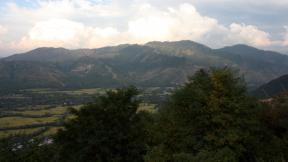
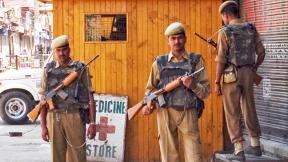
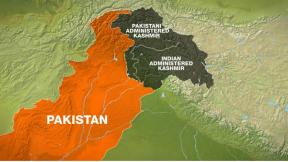
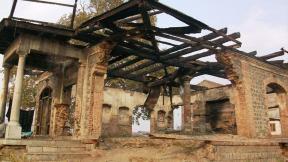
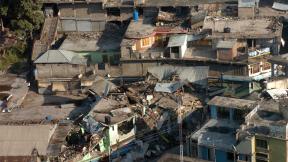


Add new comment